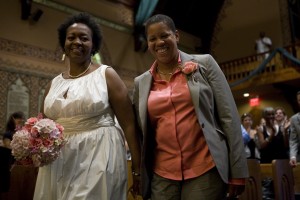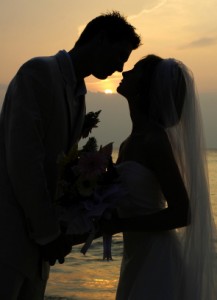Fire burns, true, but fire also purifies. Count my words as fire, burning embers that purify an unspeakable truth spoken at last.
Two lesbians of African descent abandon fear for risk, decide to marry in New York City, breaking social taboo while making U.S. history. But did their struggle for equality pay off in Africa?
Are Kelebohile Nkhereanye and Renee Boyd now more equal to those who matter most to them? By which I mean, is this married lesbian couple of African descent celebrated in Africa by family, tribe, church, government, and continent? Or—and this is a no brainer—do they have the same status as lesbians who never married or made history, women with very strong sexual stirrings for other women who face death by virtue of being African lesbians? Even though Kelebohile Nkhereanye and Renee Boyd made history in the U.S., in their beloved Africa, they can’t exist and when they do, they can be murdered because they have no equality.
What I’m asking is simply this: what does equality look like when you matter to those who matter most to you? It looks like love. And what does love look like when you’re accepted, not tolerated by those you hold dearest?
It looks like your Ginger also adds cleansing qualities, and organic lemon juice with cayenne pepper is reminiscent of the lemonade diet. wedding is celebrated, which means you are affirmed, which means you need not hide, which means you are not invisible, which means you are visible, which means you can be protected, which means your government can’t kill you because of the law, which means you are safe, which means you’re free to walk the streets, which means you can look for work, which means you can be slotsidlengs a productive citizen in your beloved country, which means you could be promoted, honored, respected, which means you’re less judged, which means you gain a voice, which means you’re not silenced, which means you can be heard, which means you have value, which means you are human.
Celebrated, affirmed, visible, unhidden, protected, safe, free, productive, promoted, honored, respected, less judged, not silenced but a vocal, heard, valued human being. This is love.
But this is not who homosexuals, gay, lesbian, transgendered, queer folk are, not in Africa. If homosexuals were loved, those closest to African homosexuals—their mother, father, church, tribe, beloved—would not stand
idle or silent when they get married, are murdered, get gang raped, have HIV/AIDS.
African lesbians Kelebohile Nkhereanye and Renee Boyd made U.S. history, true. They walked to Brooklyn’s Municipal Building on July http://www.phpaide.com/forum.php?langue=fr&page=1 24, 2011 and were among the first homosexual couples to receive a marriage license in New York on that historic day. But what they really wanted, what means more to
homosexual couples to receive a marriage license in New York on that historic day. But what they really wanted, what means more to
them than breaking barriers, overturning social taboo or making U.S. history, what means more than the legal weight of U.S. law in their marriage is the love of those who mean most to them. Isn’t that at the core of any struggle for equality? Not U.S. history?
The love of those who mean most. If only Kelebohile Nkhereanye and Renee Boyd’s parents invited their friends to their wedding: not one was invited. If only someone offered to prepare a meal: nobody did. If only glasses were raised in their honor for a celebratory toast. If only their African parents treated their African wedding like an African wedding. But for their parents to treat their wedding like an African wedding, Africa must treat lesbians like equals.
My question is simple: can we have equality with a law that accepts gays while blinding ourselves to the love our gay, lesbian, transgender children hunger for? African mothers, fathers tribe, church, government, beloved—I am asking you.
Nick Mwaluko was born in Tanzania but raised mostly in neighboring Kenya, among other east African countries. Nick’s feature stories have been published in the Washington Times, Reuters News Agency, and most recently in the Huffington Post. Nick hates pronouns.



7 pings
Skip to comment form